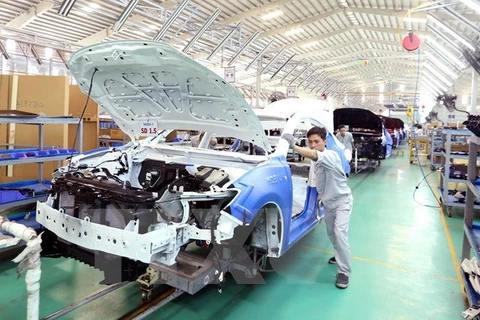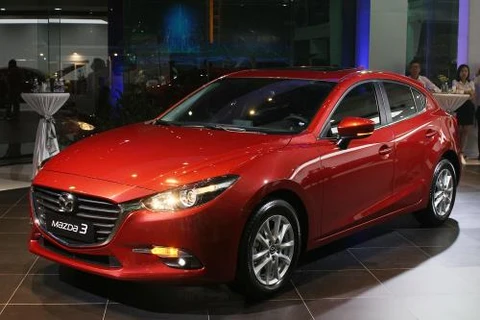 The auto industry in Vietnam is said to remain very small, which is the reason why global auto component suppliers have not made their full presence in the market (Photo: VNA)
The auto industry in Vietnam is said to remain very small, which is the reason why global auto component suppliers have not made their full presence in the market (Photo: VNA) Hanoi (VNA) – The auto industry in Vietnam is still very small, which is the reason why global auto component suppliers have not made their full presence in the market, the Automotive Working Group (AWG) said at the 2017 Vietnam Business Forum in Hanoi on June 27.
According to the group, more than 90 percent of the existing component suppliers in the country are foreign-invested companies, and the majority of components and materials for auto manufacturing and car spare parts are imported.
This dependence, together with packaging and logistics expenses and import tariffs, has made car making costs in Vietnam higher than those in Thailand or Indonesia. The gap in production cost can rise to 10 – 20 percent after tariff is abolished within ASEAN in 2018.
The AWG suggested the automotive working group of the Government should include representatives of both auto assemblers and component suppliers to get a full understanding of the industry’s situation.
Policy makers should continue working with businesses to devise solutions for narrowing the gap of production costs so as to ease the competition pressure on domestic car makers as from 2018. They also need to develop programmes to help firms to connect with one another in the auto industry.
[Ministry mulls auto industry protection]
Head of the AWG Sumito Ishii, Managing Director of the General Motors Vietnam Co. Ltd, said the top priority is to ensure a car market with sustainable growth while relevant policies must be kept stable for a long time so that businesses can devise their plans.
Deputy General Director of the Truong Hai Auto Corporation (THACO) Pham Van Tai said to develop the auto industry amid integration, the Government needs to have appropriate policies to protect the domestic car market so that enterprises can gain enough financial and technological strength and invest in research and development activities.
Policies regarding the auto industry and the industry supporting the car making sector should be consistent for at least 10 years and be in line with the integration trend, thus facilitating small- and medium-sized firms’ participation in the support industry’s value chain, he noted.
Tai also underlined the Ministry of Industry and Trade (MoIT)’s recent proposals which, he said, will create new momentum for the domestic auto industry and its support industry once they are approved. They include a proposal that the Government cut the import tariff on car components that are not made domestically from 15-20 percent to zero percent.
At the forum, businesses also asked the Government to take measures to prevent trade frauds to ensure a healthy and fair competition environment for all firms.
The MoIT earlier admitted that Vietnam failed to realise the targets set for its auto industry after over two decades of efforts. In particular, the local content of cars is just about 7 – 10 percent at present while the original targets were 40 percent by 2005 and 60 percent by 2010. Domestically made cars have lower quality and higher prices compared to imported ones, with production stopping at simple level focusing on welding, painting, assembling, and inspection.
It partly attributed the failure to instable policies on taxation, fees and infrastructure for the sector and a lack of consensus among state management agencies, thus hampering carmakers’ intention to expand operations.-VNA
VNA
























